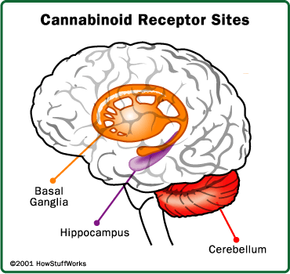Marijuana and the Brain
After you inhale marijuana smoke, its chemicals zip throughout the body. THC is a very potent chemical compared to other psychoactive drugs. Once in your bloodstream, THC typically reaches the brain seconds after it is inhaled and begins to go to work.
Marijuana users often describe the experience of smoking the drug as initially relaxing and mellow, creating a feeling of haziness and light-headedness (although those feelings may differ depending on the particular strain). The user's eyes may dilate, causing colors to appear more intense, and other senses may be enhanced. Later, the user may have feelings of paranoia and panic. The interaction of the THC with the brain is what causes these feelings. To understand how marijuana affects the brain, you need to know about the parts of the brain that are affected by THC. Here are the basics:
Advertisement
- Neurons are the cells that process information in the brain.
- Chemicals called neurotransmitters allow neurons to communicate with each other.
- Neurotransmitters fill the gap, or synapse, between two neurons and bind to protein receptors, which allow various functions in the brain and body to be turned on and off.
- Some neurons have thousands of receptors that are specific to particular neurotransmitters.
- Foreign chemicals, like THC, can mimic or block actions of neurotransmitters and interfere with normal functions.
Your brain has groups of cannabinoid receptors concentrated in several different places (see picture). These cannabinoid receptors can affect the following mental and physical activities:
- Short-term memory
- Coordination
- Learning
- Problem-solving
Cannabinoid receptors are activated by a neurotransmitter called anandamide. Like THC, anandamide is a cannabinoid, but one that your body makes. THC mimics the actions of anandamide, meaning that THC binds with cannabinoid receptors and activates neurons, which causes adverse effects on the mind and body.
High concentrations of cannabinoid receptors exist in the hippocampus, cerebellum and basal ganglia. The hippocampus sits within the temporal lobe and is important for short-term memory. When the THC binds with the cannabinoid receptors inside the hippocampus, it interferes with the recollection of recent events. THC also affects coordination, which the cerebellum controls. The basal ganglia direct unconscious muscle movements, which is another reason why motor coordination is impaired when under the influence of marijuana.
